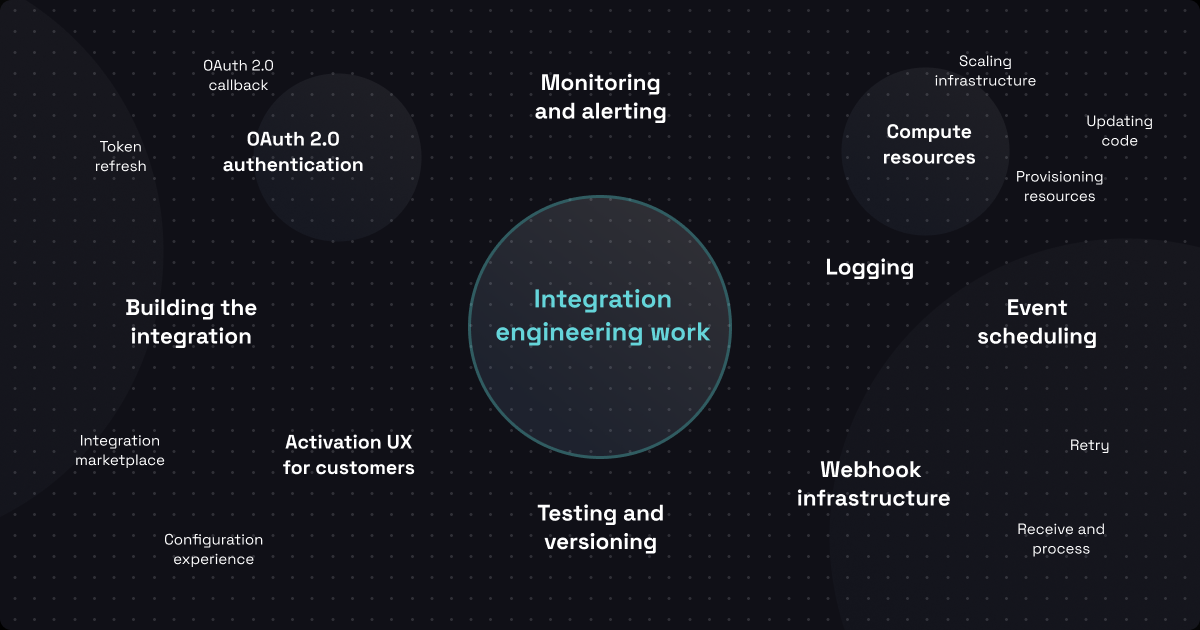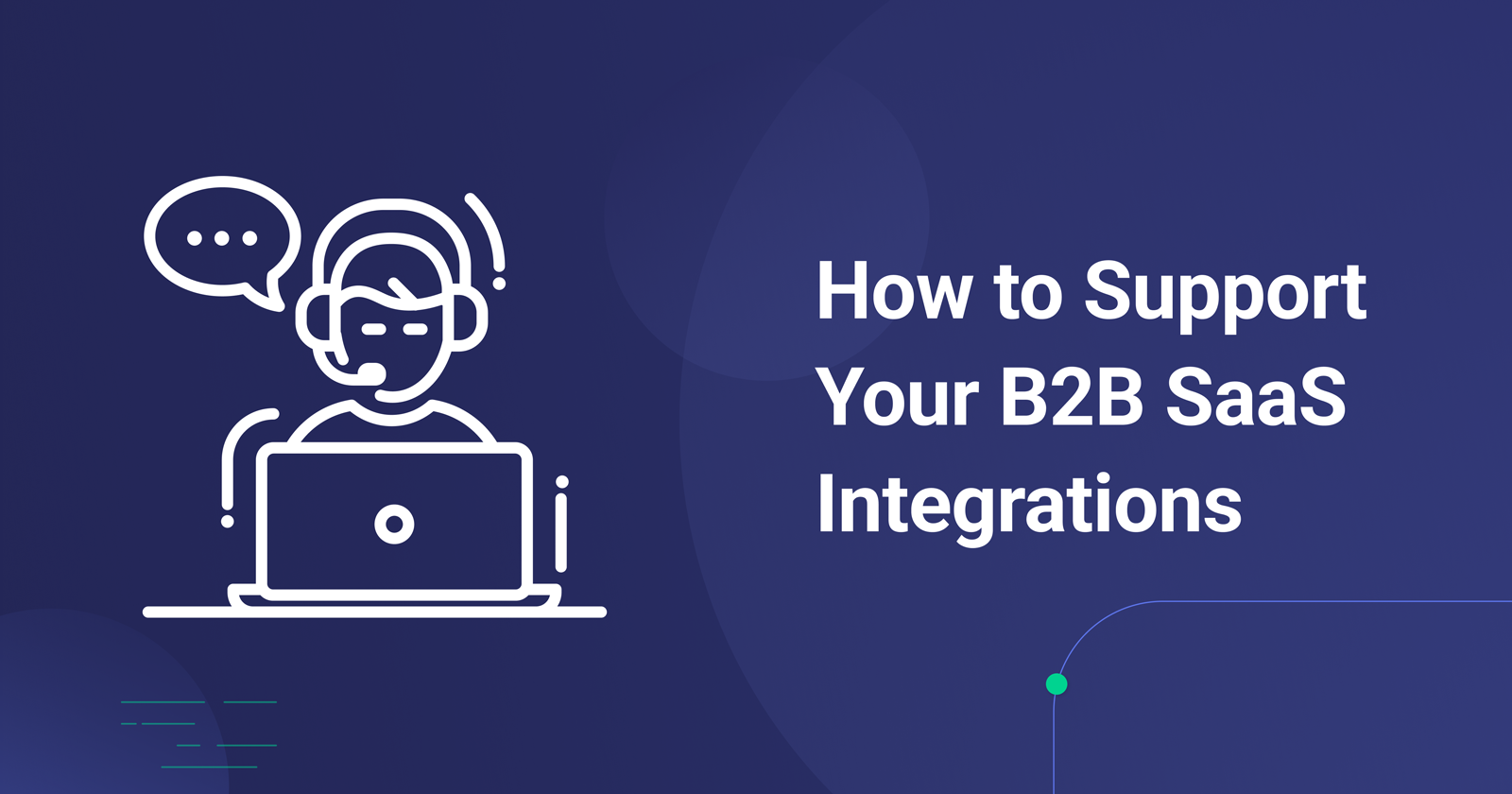Wouldn't it be neat if you could spin up your B2B SaaS integrations, and they would run flawlessly until the end of time? You know that's not reality. Instead, integration troubleshooting and support is often a frustrating experience for the customer that can become a huge time burden for your support teams.
It can become much like a game of ping pong. Your support team and your tech partner's support team each claims the problem isn't on their end. The customer is stuck, frustrated, thinking, "I just want my integration to work!"
So, the key to a better customer experience and reducing time spent on supporting B2B SaaS integrations is quickly and confidently knowing what you can know about the root cause of an issue. Is it your platform, or the customer's configuration, or the integration itself?
Skeptical? I get it. I've spent 10 years leading support/success teams at software companies with lots of mission-critical integrations and now work daily with SaaS teams on their integration strategies. Integration support truly is hard work. And there aren't any shortcuts.
Keep reading, though, because we will show you how to have a better customer integration support experience. First, let's look at integration support more broadly.
Types of integration support
While we've just talked about integration support as though it is all about fixing customer-reported issues, it should be much broader than that. Here are the four common categories of integration support:
- Fixes: What most of us think of when we hear "support." Correcting issues after our customers bring them to our attention.
- Proactive fixes: Finding and fixing issues before our customers can bring them to our attention. These fixes are often driven by testing that continues within the production environment.
- Enhancements: Integrations should also benefit from changes we make to increase the value we already provide to our customers.
- Evolutions: More comprehensive than enhancements, evolutions are things we do to stay current with changes in technology, keeping tech debt under control.
It would be great if your team could spend its time on proactive fixes, enhancements, and evolutions. But, if you are like many SaaS companies, your team spends most of its support-related time fixing customer-reported issues.
What if you could change that equation? What if implementing an embedded iPaaS would allow you to spend far less time on fixing customer-issues, and more time focused on improving your product and processes?
Isn't an embedded iPaaS for building integrations?
You might think of an embedded iPaaS enabling teams to build reusable, productized integrations for their customers. And that's mostly right. But the platform does much more than enable building integrations. It's also an excellent tool for supporting integrations.
Using an embedded iPaaS for integration support
An embedded iPaaS can improve support for your customers and save significant time for your engineering and support teams. It's just flat out a better customer experience. Let's see how.
Embedded iPaaS lets your customers support themselves
Customers are often understanding when things go wrong with B2B SaaS integrations. In most cases, their greatest concern isn't that they have an issue but rather how long it will take to resolve. And the more complex your support process is, the longer the customer waits for resolution.
An embedded iPaaS lets you place integration control directly into your customer's hands. They can configure and activate their own integrations because they have access to their integrations via the embedded marketplace. When there is an issue, they can verify the integration state and determine if the configuration is correct.
In addition, they can be notified via the built-in monitoring and alerting tools as soon as something fails (or reaches a certain point in the process) and then use that information and logging data to perform first-level support themselves. In many cases, they will be able to resolve the matter without ever creating a support ticket.
"Our customers now have an integration marketplace where they can connect and configure their integrations themselves which has reduced time and mistakes for our internal support teams."
Embedded iPaaS empowers your customer support team
Since integration details are accessible to customer support via the embedded iPaaS, team members have real power to solve integration issues without involving engineering most of the time.
Customer support knows everything from what integrations customers use to the specific values for each customer configuration, the status of each integration, and what happened the last time an integration ran.
The logging and monitoring tools help customer support cut through the common confusion that is part of integration support and quickly determine if the issue lies within your SaaS product, the customer's configuration, the integration proper, or your tech partner's app. Support can investigate and resolve many issues directly without involving engineering or your tech partner.
"It's been a game changer to give our customer success team and our technical support team access into Prismatic so they can look at logs and provide better customer support."
Embedded iPaaS decreases support time for your engineers
Traditional integrations are often bespoke, built to exact specifications for a single customer. Bespoke integrations are rarely consistent in structure and documentation. So, when it breaks, you face the risky prospect of finding the right engineer and documentation to fix it.
"Prior to Prismatic, we had at least an engineer full-time on integration support. Now support can dig into almost every issue on their own."
Embedded iPaaS solutions support the creation of reusable, configurable integrations, allowing a single integration to be built, configured N different ways, and deployed to N customers – all without engineering assistance. The integrations are consistently built, which leads to faster troubleshooting.
Since the embedded iPaaS allows non-engineers to build the integrations and for customer support to solve many issues, engineering spends far less time working on integrations than it would without the embedded iPaaS.
Because devs spend far less time on support, they can focus on actual engineering tasks, such as moving forward with the roadmap for your core product.
"Prismatic beautifully supports the model we wanted: technical support staff configure new instances of known integrations; software engineers get involved when there's something new; support staff can monitor what's happening day-to-day. Meanwhile, we can focus engineering cycles on adding value for our customers."
Integrations will always need support
But there is a better way. Using an embedded iPaaS provides critical integration insights that helps reduce the uncertainties as well as empower your customers to quickly and confidently know an issue's root cause.
As a result, you save time and effort – for your team and your customers – and improve customer satisfaction.
If your integration support would benefit from an upgrade to an embedded iPaaS, schedule a demo.



